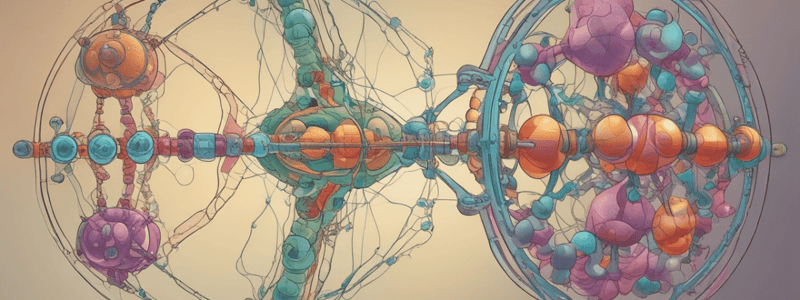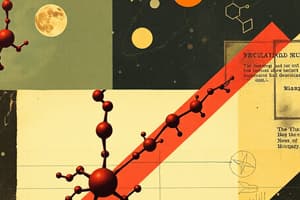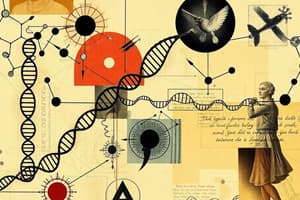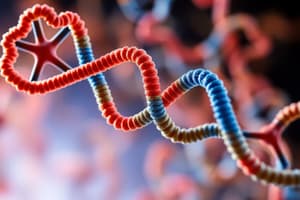Podcast
Questions and Answers
What are the two main components of nucleotides?
What are the two main components of nucleotides?
- Amino acids and fatty acids
- Lipids and proteins
- Sugar and phosphate groups (correct)
- Purines and pyrimidines (correct)
What is the role of pancreatic juice in the digestion of nucleic acids?
What is the role of pancreatic juice in the digestion of nucleic acids?
- It hydrolyses nucleic acids into mononucleotides (correct)
- It absorbs nucleic acids
- It converts nucleotides into pyrimidines
- It synthesizes purines and pyrimidines
Which of the following is NOT a source of dietary purines and pyrimidines?
Which of the following is NOT a source of dietary purines and pyrimidines?
- Liver and meat
- Legumes and cereals
- Tea, coffee, and cola
- Egg, milk, and cheese (correct)
What is the importance of UDP-glucuronic acid in the body?
What is the importance of UDP-glucuronic acid in the body?
Which of the following is a biomedical importance of purines and pyrimidines?
Which of the following is a biomedical importance of purines and pyrimidines?
What happens to ingested nucleic acids and nucleotides in the intestinal tract?
What happens to ingested nucleic acids and nucleotides in the intestinal tract?
What is the term for the compounds formed from the linkage of a sugar with a nitrogen-containing base?
What is the term for the compounds formed from the linkage of a sugar with a nitrogen-containing base?
Which of the following is a gout disease treatment?
Which of the following is a gout disease treatment?
What is the primary function of nucleosidases?
What is the primary function of nucleosidases?
What happens to unabsorbed purines in the gut?
What happens to unabsorbed purines in the gut?
What is the site of purine base catabolism?
What is the site of purine base catabolism?
What is the end product of purine base catabolism in humans?
What is the end product of purine base catabolism in humans?
What is the normal range of uric acid in females?
What is the normal range of uric acid in females?
What is the underlying cause of gout?
What is the underlying cause of gout?
What is Lesch-Nyhan syndrome inherited as?
What is Lesch-Nyhan syndrome inherited as?
What is the most painful manifestation of gout?
What is the most painful manifestation of gout?
What is the primary cause of Lesch-Nyhan syndrome?
What is the primary cause of Lesch-Nyhan syndrome?
What is the composition of renal stones in gout?
What is the composition of renal stones in gout?
In which organisms is ammonia the end product of protein catabolism?
In which organisms is ammonia the end product of protein catabolism?
What is a common symptom of Lesch-Nyhan syndrome?
What is a common symptom of Lesch-Nyhan syndrome?
What is hypouricemia due to?
What is hypouricemia due to?
What is the result of adenosine deaminase deficiency?
What is the result of adenosine deaminase deficiency?
What is the daily excretion of uric acid in urine?
What is the daily excretion of uric acid in urine?
What is the effect of a purine-free diet on uric acid excretion?
What is the effect of a purine-free diet on uric acid excretion?
Which of the following statements about the catabolism of pyrimidines is TRUE?
Which of the following statements about the catabolism of pyrimidines is TRUE?
What is the main cause of β-amino isobutyric aciduria?
What is the main cause of β-amino isobutyric aciduria?
What are the characteristic symptoms of orotic aciduria?
What are the characteristic symptoms of orotic aciduria?
What is the mechanism by which uridine and cytidine treat orotic aciduria?
What is the mechanism by which uridine and cytidine treat orotic aciduria?
Which of the following conditions can lead to increased levels of β-aminoisobutyric acid in urine?
Which of the following conditions can lead to increased levels of β-aminoisobutyric acid in urine?
What is the role of Orotate phosphoribosyl transferase and Orotidine 5'-phosphate decarboxylase (OMP decarboxylase) in pyrimidine metabolism?
What is the role of Orotate phosphoribosyl transferase and Orotidine 5'-phosphate decarboxylase (OMP decarboxylase) in pyrimidine metabolism?
Which of the following statements about orotic aciduria Type I and Type II is TRUE?
Which of the following statements about orotic aciduria Type I and Type II is TRUE?
Which of the following is NOT a characteristic of orotic aciduria?
Which of the following is NOT a characteristic of orotic aciduria?
Flashcards
Purines and Pyrimidines
Purines and Pyrimidines
Heterocyclic aromatic compounds that, along with sugar and phosphate groups, are components of nucleotides.
Purines
Purines
Adenine and guanine, double-ring structures.
Pyrimidines
Pyrimidines
Thymine, uracil, and cytosine; single-ring structures.
Nucleoside
Nucleoside
Signup and view all the flashcards
Purines and Pyrimidines Importance
Purines and Pyrimidines Importance
Signup and view all the flashcards
Purine/Pyrimidine Non-Essentiality
Purine/Pyrimidine Non-Essentiality
Signup and view all the flashcards
Pancreatic Nucleases
Pancreatic Nucleases
Signup and view all the flashcards
Uric Acid Formation
Uric Acid Formation
Signup and view all the flashcards
Purine Catabolism Site
Purine Catabolism Site
Signup and view all the flashcards
Xanthine Oxidase
Xanthine Oxidase
Signup and view all the flashcards
Uric Acid
Uric Acid
Signup and view all the flashcards
Gout
Gout
Signup and view all the flashcards
Hyperuricemia
Hyperuricemia
Signup and view all the flashcards
Lesch-Nyhan Syndrome
Lesch-Nyhan Syndrome
Signup and view all the flashcards
Lesch-Nyhan Cause
Lesch-Nyhan Cause
Signup and view all the flashcards
Lesch-Nyhan Symptoms
Lesch-Nyhan Symptoms
Signup and view all the flashcards
Hypouricemia
Hypouricemia
Signup and view all the flashcards
Hypouricemia Causes
Hypouricemia Causes
Signup and view all the flashcards
Xanthine Oxidase Deficiency
Xanthine Oxidase Deficiency
Signup and view all the flashcards
β-Alanine
β-Alanine
Signup and view all the flashcards
β-Amino Isobutyric Acid
β-Amino Isobutyric Acid
Signup and view all the flashcards
β-Amino Isobutyric Aciduria
β-Amino Isobutyric Aciduria
Signup and view all the flashcards
Hereditary Orotic Aciduria Type I
Hereditary Orotic Aciduria Type I
Signup and view all the flashcards
Hereditary Orotic Aciduria Type II
Hereditary Orotic Aciduria Type II
Signup and view all the flashcards
Hereditary Orotic Aciduria Symptoms
Hereditary Orotic Aciduria Symptoms
Signup and view all the flashcards
What are the main Purines?
What are the main Purines?
Signup and view all the flashcards
What are the main Pyrimidines?
What are the main Pyrimidines?
Signup and view all the flashcards
Dietary source of Purines and Pyrimidines
Dietary source of Purines and Pyrimidines
Signup and view all the flashcards
What is Gout?
What is Gout?
Signup and view all the flashcards
Catabolism location of pyrimidines
Catabolism location of pyrimidines
Signup and view all the flashcards
Study Notes
Purines and Pyrimidines
- Purines and pyrimidines are heterocyclic aromatic compounds that form the important components of nucleotides along with sugar and phosphate groups.
- Purines include adenine and guanine, while pyrimidines include thymine, uracil, and cytosine.
Nucleotide Structure
- A nucleoside is formed from the linkage of a sugar with a nitrogen-containing base.
Biomedical Importance
- DNA and RNA are nucleic acids composed of purines and pyrimidines.
- ATP and GTP are energy carriers.
- NADH and FADH are co-enzymes.
- S-Adenosyl-methionine is a donor for methyl groups.
- UDP-glucuronic acids are donors for conjugation (e.g., bilirubin glucuronide).
- cAMP and cGMP are involved in hormone signaling.
- Anticancer drugs (e.g., MTX, 5-Flu, 6-TG, 6-MG) and antiviral drugs (e.g., Aciclovir, Lamivudine) are developed based on purine and pyrimidine metabolism.
- Allopurinol is used to treat gout disease.
Dietary Non-Essentiality
- Human tissues can synthesize purines and pyrimidines, making them dietarily non-essential.
- Ingested nucleic acids and nucleotides are degraded in the intestinal tract to mononucleotides, which may be absorbed or converted to purine and pyrimidine bases.
- Dietary sources of purines and pyrimidines include liver, meat, legumes, cereals, and vegetables, as well as tea, coffee, cocoa, and cola.
Purine and Pyrimidine Metabolism
- Digestion and absorption: pancreatic juice contains nucleases that hydrolyze nucleic acids into mononucleotides, which are then broken down by nucleotidases and intestinal phosphatases.
- Unabsorbed purines are converted to uric acid by intestinal bacteria, which may be absorbed and excreted in urine.
Catabolism of Purine
- Site: liver (intracytoplasmic)
- Hypoxanthine is oxidized into xanthine, and further into uric acid by xanthine oxidase.
- Uric acid diffuses to the blood to be excreted by the kidney.
- Uric acid is the end product of purine base catabolism.
Gout
- Gout is a metabolic disorder related to excess production and deposition of uric acid crystals (hyperuricemia).
- Hyperuricemia is characterized by recurrent attacks of acute inflammatory arthritis.
- Normal blood uric acid levels are 3-7 mg/dl (males) and 2-6 mg/dl (females).
- It is excreted in urine (0.7 gm/day), with decreased excretion in cases of purine-free diet.
Lesch-Nyhan Syndrome
- Lesch-Nyhan syndrome is an X-linked recessive disorder caused by defects in the activity of the purine nucleotide salvage enzyme, hypoxanthine-guanine phosphoribosyl transferase.
- Causes: deficiency of the enzyme HGPRT, produced by mutations in the HPRT gene.
- Symptoms: severe gout, kidney problems, poor muscle control, and moderate mental retardation.
Hypouricemia
- It may be renal (due to low renal threshold) or metabolic (due to decreased uric acid formation).
- Causes of metabolic hypouricemia:
- Deficiency of adenosine deaminase (adenosinuria)
- Deficiency of xanthine oxidase (hypoxanthine and xanthine are excreted in excess in urine)
- Deficiency of purine nucleosidase (accumulation of guanosine and inosine leading to guanosinuria)
- Deficiency of folic acid (decreased de novo synthesis of purines)
Catabolism of Pyrimidines
- This occurs mainly in the liver.
- β-Alanine is the major end product of both uracil and cytosine.
- β-Amino isobutyric is the major end product of thymine.
Disorders of Pyrimidine Metabolism
- β-Amino isobutyric aciduria: characterized by excretion of large amounts of β-aminoisobutyric in urine, caused by defective deamination of β-aminoisobutyric acid.
- Hereditary orotic aciduria:
- Type I: caused by defective orotate phosphoribosyl transferase and orotidine 5'-phosphate decarboxylase, leading to retarded growth, severe anemia, and megaloblastic bone marrow.
- Type II: caused by defective OMP decarboxylase, similar to Type I.
Studying That Suits You
Use AI to generate personalized quizzes and flashcards to suit your learning preferences.




